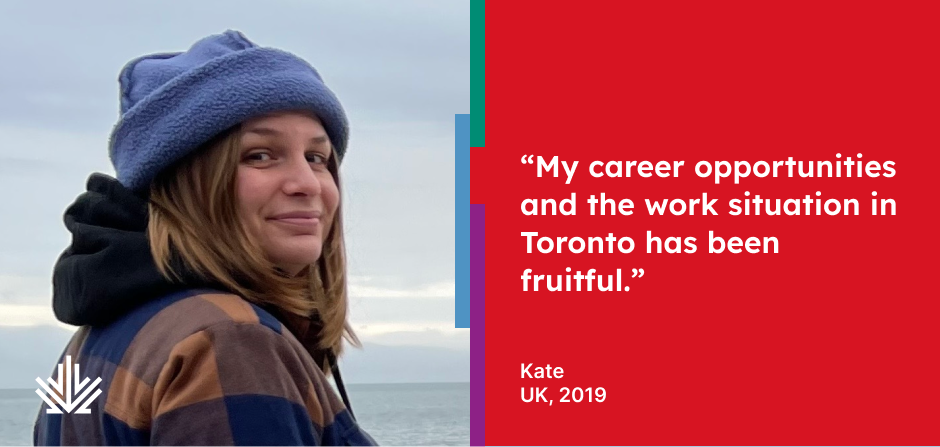From an interview with Kate Standing
Kate Standing was looking for adventure and change when she decided to live abroad. Following in the footsteps of a few friends, she moved to Toronto through the International Experience Canada (IEC) with a plan to stay for two years. She describes how she found an ideal place to live, landed a job in her industry, met her partner, and eventually decided to stay.
I was born and raised in Bath, England, where I lived until I left to attend university in a city called Brighton. After living in Brighton for about 10 years, I was feeling restless. I wanted to try something different. Although I’d come up with a couple of schemes, none had worked out, so I was searching for something new.
At the time, I was 29 years old and had never lived abroad. I decided to look for a way to experience it which was accessible in terms of language and career opportunities. A few of my friends had moved to Canada two to three years earlier, and I knew I could follow the same path they took. I also knew that if I decided to move to Toronto, I would have a friendship group to support me through my transition.
Applying through International Experience Canada (IEC)
I applied for a visa through the International Experience Canada (IEC). It’s a program that’s open to certain partner countries around the world, including the UK. The IEC gives you up to two years to live, travel, and work in Canada—which is an amazing amount of time. Whereas, if you were only allowed to stay for one year, it might feel like your time is up just as you’re getting started. The luxury of two years allows you more time to establish yourself and get to know the place.
I applied through the Working Holiday category offered through the IEC, which provides an open work permit so that I can work for any employer, as well as have the flexibility to both travel and work during my stay. Under the Working Holiday category, there’s no requirement to have a job lined up before moving to Canada, nor do you have to work while living here. Someone can choose to pick up casual work or freelance, if desired. It’s incredibly flexible compared to what other countries offer.
I applied to IEC when I was 29 years old and got the green light within the year. There is an age limit for IEC applicants, so once I got my visa, I had to activate it before turning 31.
Getting settled in Toronto
I moved to Toronto in February of 2019 and stayed in an Airbnb. On my first morning after arriving, I woke up to a snowstorm. I had never seen this much snow before and wondered if it was even safe for me to go outside. The internet wasn’t working in my Airbnb, so I put on my coat and walked to a nearby café. There weren’t any people outside and it felt like a ghost town. It seemed wild at the time, but now I look back and find it very funny.
Of course, having just moved here, I had to set up all sorts of practical elements, such as opening a bank account and getting a cell phone. I asked my friends for recommendations and followed their advice, trusting they’d already researched the best options. It was at this time I opened my RBC bank account.
When I first moved to Toronto, I remember one of things that most surprised me was being able to split the restaurant bill. You can’t do that in England, where you’re forced to pay for rounds and wait until you can buy out your round. The fact that you can just pay for what you’ve ordered is so straightforward. The service industry, overall, is quite different here, and I really like that.
Finding a permanent place to live
I didn’t stay long at the Airbnb I’d first moved into, and hopped around for about a month as I searched for an apartment. I’d done some research before moving here and learned that as a newcomer with no credit history, people often resorted to paying six months’ rent in advance to secure a rental, which seemed very complicated to me. So, I ended up subletting an apartment I found through Facebook.
The upside was that I wasn’t on the lease, so I didn’t have any financial responsibility related to the house, but I had no security related to the house, either. It worked out well, as I lived there for about 18 months and was able to leave that apartment easily when the time came. It was an ideal scenario for me while I figured things out.
Searching for a job in Canada
Since I left my job in England when I moved to Canada, I had planned to find a new one pretty immediately after arriving here. However, I think I was a bit naïve about how quickly I was going to find employment. It took me longer than anticipated, and I ended up taking a more junior role than planned.
When I got the job offer for the junior role, my friend sat me down and said, “Take the job, Kate.” I didn’t want to but she convinced me to do it. That was some of the best advice I’ve ever been given. It provided stability for a few months while I looked for employment more suited to my career aspirations.
I found it a struggle to land the type of job I wanted without any connections here. I didn’t know anybody, and I didn’t know the companies, either. Unfortunately, employers did not recognize the companies listed on my resume. I also think some recruiters were reluctant to hire me in the types of roles I was seeking because I was on a two-year work visa with no guarantee I’d stay beyond that.
In interviews, I’d have to address that I was here on a visa from England to ensure recruiters I was legal to work in Canada and they would not have to sponsor me. But the blowback to that was they’d ask questions about my plans at the end of my two years. I realized my response, “I don’t know,” was not the best one. I learned a better way to answer these types of interview questions.
I kept the junior role for about three months before getting a more suitable job offer. I was lucky to be quite open with my first employer about my job hunt. They understood it was a stepping stone and were okay with that.
My career opportunities and work situation in Toronto has been fruitful, overall. The great work opportunities I’ve had in Toronto wouldn’t be available in many places in England, except maybe London. So that’s been a real benefit of moving here.
Building a social network
I met my partner, who is Canadian, two months after moving here, and got introduced to his friendship group. That’s played a huge role in who I spend time with since we have now been together almost four years.
I also had friends living here when I arrived from the UK, so my social network also includes many Brits, as well as other people who moved to Toronto and don’t have family nearby. At times, I found the social aspect quite difficult, especially during the pandemic. Some friendships that were beginning to form got cut short with the pandemic, unfortunately.
Staying connected to family
The pandemic also impacted my ability to visit my family who I’m very close with. My two sisters and parents still live in England. When I lived there, my sisters and I did a lot together, so that was a tough transition when I moved to Canada. It didn’t help that I couldn’t see my family for a long time because of the pandemic. That was very rubbish.
Over the last year, things have greatly improved as I’ve seen them a lot more. I visited the UK a couple times last year and my parents came to visit me here. Later this year, my sisters are planning to travel to Toronto, as well. I’m excited to show everybody my new life here.
I’m now a permanent resident of Canada. Once you’ve been in the country for a certain amount of time, or you’ve got one year’s work experience, you can apply for permanent residency, as I did.
I can stay indefinitely, as long as I renew my PR every five years. But I’ll soon be eligible to apply for Canadian citizenship, which will give me dual citizenship. That means I’ll be able to vote, which is something I’m looking forward to!





